Celebrating Leadership: Inside VM's First Leadership Summit
NEW YORK—About 200 industry suppliers, optical retailers and eyecare professionals gathered here on the eve of International Vision Expo East for the first Vision Monday Leadership Summit. Moderated by Bill Scott, Jobson Optical Group's vice president/optical retail group publisher, and Marge Axelrad, senior VP/editorial director, the event brought together as speakers top executives from the international eyewear/eyecare business as well as experts from outside the industry, to share their views on key issues impacting optical and vision care today and tomorrow.
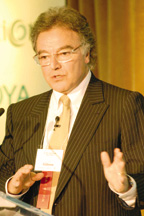 |
| Alain Afflelou of France's Alain Afflelou chain talked about his company's evolution in Europe. |
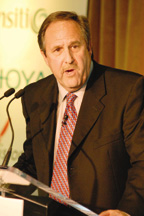 |
| Al Bernstein of Nationwide Vision describes how his chain addresses its various customer demographics. |
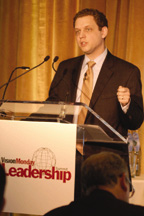 |
| Speaker Darren Friedman, a partner in Citigroup Private Equity, goes over the pros and cons ofprivate vs. public financing for optical firms. |
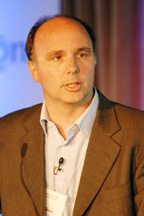 |
| Luxottica Group's CEO, Andrea Guerra, speaks on verticalintegration and the increasing globalizationof the optical industry. |
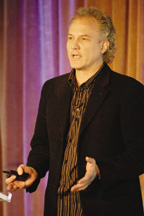 |
| Scott Olivet, CEO of Oakley, outlines how strengthening a company's brand identity can boost its market position. |
A highlight of the VM Leadership Summit was an international panel of chief executive officers—Bob Gray of Highmark Vision Holding Co., Scott Olivet of Oakley and Andrea Guerra of Luxottica Group—discussing vertical integration in the optical business.
Gray spoke of how Highmark's recent acquisitions of Viva International and the Eye Care Centers of America chain are integrating with its managed-vision business. "We believe it's very important to have a blended network, and important to have our own proprietary retail chain," he stated.
Gray noted that Highmark's Davis Vision managed-vision plans now cover nearly 36 million people, including discount members, adding, "Our goal is by the end of 2009 to insure 18 million funder lives."
Guerra outlined Luxottica's global expansion in both wholesale and retail, noting how the company is changing to meet consumers' altered expectations and to capitalize on opportunities in emerging markets as well as in the U.S. The evolution of eyewear from a medical device to a fashion accessory has been an integral part of those altered expectations, he noted: "Years ago the [ophthalmic] frame was a functional object only; now it has been discovered to be part of our personality and what we represent."
As part of that shift, "the way consumers look at the objects we sell is completely different today—the luxury and jewelry businesses have seen this already," Guerra told the VM Leadership Summit audience.
Oakley's Olivet told how his company is working to maintain and strengthen its brand image, including broadening its own retail-store ownership. "True brand authenticity is hard to come by and getting harder to create," he noted. "And consumers' relationship to brands has changed forever."
Olivet added that the consumer defines a product or retail brand by his or her last contact with that brand, so that contact needs to be positive.
Looking specifically at the challenges facing optical retailers today, earlier in the Summit Alain Afflelou—founder, president and directeur general of France's 846-unit Alain Afflelou chain—said his company is adapting to changing customer patterns by adding a second retail brand, Plurielles, that offers fixed pricing for all eyeglasses, as well as expanding its private-label eyewear offering.
Looking at the growing attempts to sell ophthalmic eyewear over the Internet, Afflelou noted, "People need to try on, touch and see their eyewear in person. Also, shopping is a pleasure—I don't thnk the Internet will replace that."
Al Bernstein, president of the 57-location Nationwide Vision chain in Arizona, talked of his company's varying customer demographics and how the chain addresses each type of customer. "We tap into consumer attitudes by looking at different population segments and different marketing vehicles," he said.
Added Bernstein, "We know that 'one size does not fit all'—Nationwide targets seven different demographic groups, so we use different traditional and non-traditional media to address them," such as advertising in Spanish-language publications and broadcast media to reach the market's growing Hispanic population.
Summit speaker Robin Lewis, a retailing expert who is president of Robin Lewis Inc., said the U.S. retail industry in general "is in the middle of the biggest transition in history—a complete redefinition of retailing" caused by the consumer's growing sense of empowerment.
"Today's consumers have unlimited choices and thousands of equally compelling products or competitors—that gives them the power to make [retailers and suppliers] jump through hoops and change [their] businesses to serve them," Lewis declared.
Erin Byrne, global chief digital strategist for Burson-Marsteller, explained how the Internet can help optical firms better reach their customers through electronic approaches such as podcasts and interactive Web sites. "There's a huge opportunity for companies willing to create dialogue and engage 'e-fluential' people," she said, noting mushrooming consumer interest in getting information about eyecare and eyewear products via the Internet.
Speaker Darren Friedman, a partner in Citigroup Private Equity, outlined the pros and cons of private vs. public financing for optical firms. "Having capital available allows us to think outside the box," Friedman said, adding, "Private equity firms can help companies develop and grow."
He said going private can give a firm the ability to take a longer-term view of its actions and their consequences, compared to a public company's need to meet quarterly projections and keep stockholders happy.—Cathy Ciccolella

